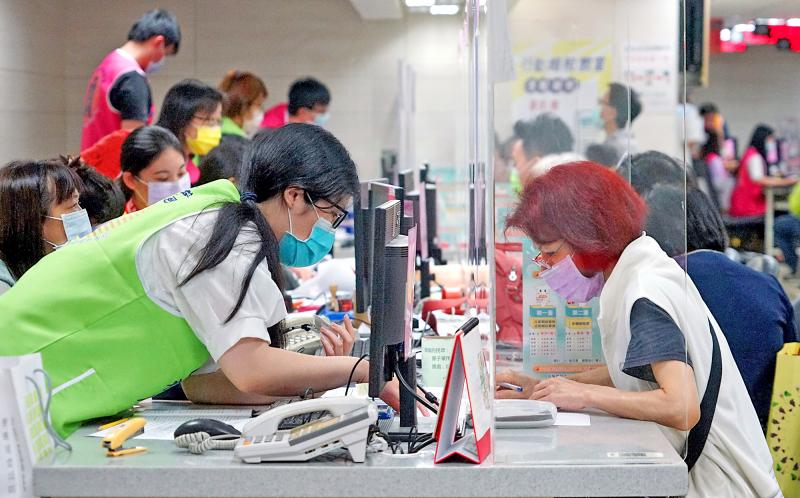The national treasury last month collected NT$132.7 billion (US$4.75 billion) in tax revenue, an increase of 11.4 percent from a year earlier, bolstered mainly by sharp increases in securities and property transactions, the Ministry of Finance said yesterday.
Securities transactions generated a record NT$24.4 billion in tax revenue, rising 1.6 times from a year earlier, as daily turnover on the Taiwan Stock Exchange and the Taipei Exchange expanded almost threefold to a new high of NT$526.9 billion, Department of Statistics Deputy Director-General Chen Yu-feng (陳玉豐) told a news conference in Taipei.
Securities transaction tax revenue has increased for 19 consecutive months, the third-longest streak of gains, trailing only 21 months from 1996 to 1997 and 22 months from 1988 to 1990, Chen said.

Photo: CNA
The figure might climb higher this month based on daily trading volumes so far.
Market turnover yesterday surged to a record NT$714.835 billion, even though COVID-19 pandemic selloffs pushed the TAIEX down 652.48 points to 16,583.13.
For the first four months of this year, securities transaction tax revenue more than doubled from the same period last year to NT$80.4 billion, the ministry’s monthly report showed.
Land value increment tax revenue contributed NT$8.4 billion to the state chest, representing an annual increase of 12.1 percent, as the number of taxable cases swelled 23.6 percent to 57,510, it said.
A total of 226,643 deals subject to property gains taxes were recorded from January to last month, an increase of 21.1 percent from a year earlier, the ministry said.
Inheritance and gift tax revenue last month rose 63.6 percent to NT$3.9 billion, while sales tax revenue grew 11.5 percent to NT$16 billion, it said.
By contrast, personal income tax revenue shrank 2.4 percent to NT$28.6 billion, while corporate income tax revenue slid into negative territory due to tax returns, Chen said.
Tax revenue in the first four months of this year increased 15.5 percent year-on-year to NT$599.9 billion, beating the ministry’s forecast by 16.6 percent and covering 24.6 percent of the government budget for this year, the report said.

NEW IDENTITY: Known for its software, India has expanded into hardware, with its semiconductor industry growing from US$38bn in 2023 to US$45bn to US$50bn India on Saturday inaugurated its first semiconductor assembly and test facility, a milestone in the government’s push to reduce dependence on foreign chipmakers and stake a claim in a sector dominated by China. Indian Prime Minister Narendra Modi opened US firm Micron Technology Inc’s semiconductor assembly, test and packaging unit in his home state of Gujarat, hailing the “dawn of a new era” for India’s technology ambitions. “When young Indians look back in the future, they will see this decade as the turning point in our tech future,” Modi told the event, which was broadcast on his YouTube channel. The plant would convert

‘SEISMIC SHIFT’: The researcher forecast there would be about 1.1 billion mobile shipments this year, down from 1.26 billion the prior year and erasing years of gains The global smartphone market is expected to contract 12.9 percent this year due to the unprecedented memorychip shortage, marking “a crisis like no other,” researcher International Data Corp (IDC) said. The new forecast, a dramatic revision down from earlier estimates, gives the latest accounting of the ongoing memory crunch that is affecting every corner of the electronics industry. The demand for advanced memory to power artificial intelligence (AI) tasks has drained global supply until well into next year and jeopardizes the business model of many smartphone makers. IDC forecast about 1.1 billion mobile shipments this year, down from 1.26 billion the prior

People stand in a Pokemon store in Tokyo on Thursday. One of the world highest-grossing franchises is celebrated its 30th anniversary yesterday.

Zimbabwe’s ban on raw lithium exports is forcing Chinese miners to rethink their strategy, speeding up plans to process the metal locally instead of shipping it to China’s vast rechargeable battery industry. The country is Africa’s largest lithium producer and has one of the world’s largest reserves, according to the US Geological Survey (USGS). Zimbabwe already banned the export of lithium ore in 2022 and last year announced it would halt exports of lithium concentrates from January next year. However, on Wednesday it imposed the ban with immediate effect, leaving unclear what the lithium mining sector would do in the